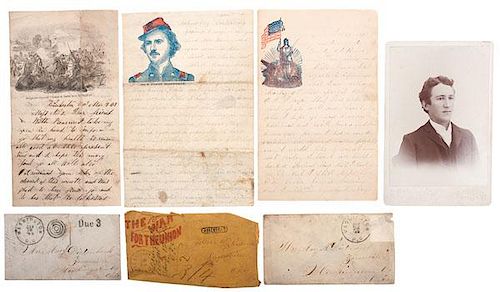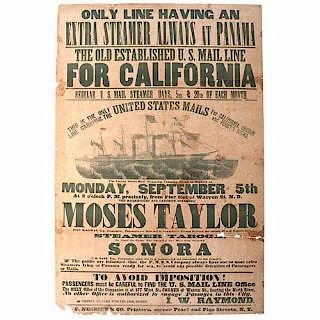Ohio 122nd Volunteer Infantry, Civil War Correspondence from Pvts. Detenbeck, Voll, and Watson, Each KIA
About Seller
6270 Este Ave.
Cincinnati , OH 45232
United States
With offices in Cincinnati, Cleveland and Denver, Cowan’s holds over 40 auctions each year, with annual sales exceeding $16M. We reach buyers around the globe, and take pride in our reputation for integrity, customer service and great results. A full-service house, Cowan’s Auctions specializes in Am...Read more
Two ways to bid:
- Leave a max absentee bid and the platform will bid on your behalf up to your maximum bid during the live auction.
- Bid live during the auction and your bids will be submitted real-time to the auctioneer.
Bid Increments
| Price | Bid Increment |
|---|---|
| $0 | $25 |
| $500 | $50 |
| $1,000 | $100 |
| $2,000 | $250 |
| $5,000 | $500 |
| $10,000 | $1,000 |
| $20,000 | $2,500 |
| $50,000 | $5,000 |
| $100,000 | $10,000 |
About Auction
Jun 10, 2016 - Jun 11, 2016
Cowan's Auctions dawnie@cowans.com
- Lot Description
Ohio 122nd Volunteer Infantry, Civil War Correspondence from Pvts. Detenbeck, Voll, and Watson, Each KIA
Lot of 35 letters from soldiers, Private Jacob Detenbeck and Private Andrew Voll, 122nd OH Inf., Co. A, both KIA, one at the Battle of the Wilderness, and Private David E. Watson, 122nd OH Inf., Co. K, KIA. Ca 1862-1864.
Standing in the crisp air near the Muskingum River in 1862, 19-year-old Private Jacob Detenbeck, 22-year-old Private Andrew Voll, and 28-year-old Private David E. Watson most likely struggled to stand at attention before leaving with the 122nd OH Inf. to travel to Parkersburg, WV. The family members and dear friends shared an uncanny amount of similarities: each hailed from Zanesville, enlisted in the army within three weeks of one another, mustered in as privates in the same infantry, and wrote letters to John and Mary Detenbeck. Not one of them anticipated that they would also share the same fate—death on the battlefield.
Detenbeck and Voll enlisted within three days of one another and joined Co. A. while Watson joined Co. K. Watson, Detenbeck, and Voll were the sons of a German immigrant, and their siblings, John Detenbeck and Mary (Voll) Detenbeck, married in 1860. Watson had enough personality for the three combined and always spoke his mind, no matter how crass or brash. On March 9, 1863 Watson wrote to his brother John, I think we will have a game of ball with the damed rebels in a few days for we are going a rebel hunting tomorrow so the report is and if we find any I am a going to give them the best turn in the shop. (Winchester, March 9, 1863). When John’s wife Mary asked him to come to a corn husking, he wrote, I am going to ask for a furlow soon but I don’t no if I will get it or not for I aint good at sucking peoples asses for favors… (Brandy Station, VA, December 28, 1863). Mary’s brother, Andrew Voll, had a much gentler response to her invitation, Uncle Sam says he cant let me go to frolics he has too much work of his own to spare his boys, wrote Voll. Even if I am not there I will be there in spirit but spirits cant husk corn so you will not look fore the shuck I husk…(Brandy Station, VA Nov 13 1862). Watson still managed to interject curses into Voll’s letter as well. Dave Watson says bad luck to the ship that is keeping him in Dixie… He swears the devil might blow sand in his eyes if he did not go fore your crout barrel...(Andrew, Brandy Station, VA Nov 13 1862). Although eager to rebel hunt, Watson, Voll, and Detenbeck did not enlist to free the slaves.
I wish all the damed abolition curses would have to shoulder a musket…and would have to fight like the Devil and at last get their throats cut from ear to ear, wrote Watson (Winchester, March 9, 1863). Not all Union soldiers fought to free the slaves, but to preserve the Union. I came out to save the union and the cornerstone [slavery] and I intend to stick to that cause as long as I am able to carry a gun, wrote Watson. (Well Town, VA Aug 18, 1863). Fighting on the battlefield did little to quell tensions between the pro-slavery and anti-slavery factions, if anything, they increased. During the gubernatorial Ohio election of 1863, outspoken anti-war candidate Clement Vallandigham ran for Congress. He and his party, the Copperheads, believed that Lincoln should let the Confederacy secede in order to stave off any violence. Watson and Voll wrote several letters to John and Mary arguing over abolitionism and their aversion to Vallandigham. I am no abolitionist if I am helping to free the d d n***** that proclamation come out since I enlisted but I think slavery is the cornerstone of this rebellion, wrote Watson. (Well Town, VA Aug 18, 1863). The same day Voll wrote to their brother John:
You seem to think that I cant or dont read any other paper but the Baltimore American Now my friend let me inform you that you are badly mistaken It appears to me that you are a great friend of the Zanesville Aurora also of the Ohio Statesmen I reckon you dont call them abolition papers do you. Ill tell you what I call them damn Secesh and that is just what they are…all they have to say is Vallandigham Vallandigham Now what has the great patriot as you call him done I see nothing so great that you need to make such a fuss about him…if Val gets to be governor and this war is not settled this fall my word fore it he will aid the South fore he is just one of them kind of men…(Martinsburg, VA August 18, 1863).
Vallandigham voiced his anti-war sentiments so loudly that he was arrested in May 1863 and tried for infringing upon General Order No. 38. Abraham Lincoln had him exiled to the Confederacy. Despite his banishment, the Ohio democratic party announced at the June 11th convention that he could run as Governor in absentia. His running mate, George Pugh assumed Vallandigham's campaign duties and represented his views on the trail. They ultimately lost the election because victories at Gettysburg and Vicksburg convinced many Ohioans to vote for the Union party leader. Voll changed his political position on slavery during the war. He told his sister that he began to lean towards abolition and she could spite him as much as she wanted for it (August 18, 1863). He even signed one of his letters, your abolitionist brother (Camp Brandy Station, VA, December 7, 1863). Combat or witnessing the slave South might have influenced Voll to change his position.
The 122nd OH consistently saw dangerous combat and traveled mostly through Virginia. Voll wrote to Mary, Our regiment lay in the fire of the rebel artillery fore upwards of twenty minutes and the way the shell howled over and around us was not slow I looked fore my doom but my time had not yet come….[a] Co E boy was wounded right behind me...the fellow was wounded in the left leg slightly. (Brandy Station, VA, November 13, 1862). In the summer of 1863, Watson toiled in a hospital bed as Jake’s body festered on the field. Angry after his son’s death, Kasper Detenbeck cursed Voll for not falling first. Voll wrote to his sister, Oh horrible wish fore a fellow being to wish such to a soldier I fore give him fore Jakes sake I was not the first to fall as it was wished me but instead of me falling my dear friend Jake fell would it to of been my own brother I could of took it no harder the curses and wishes of his father ringing in my ears ever day as though I had of heard them…(Sharpsburg, MD, July 26, 1863). Voll continued to fight and was always aware of his mortality and the chance of death. In an almost prophetic statement, he wrote to his sister, There will be but few boys left after this war is over for there is going to be thousands killed this summer and no doubt I will be one of the many that will be left on the field of battle (March 19, 1864). Voll and Watson fought in the Battle of the Wilderness, which was a disaster for their regiment, losing 120 men the first day. Voll and Watson survived the first day, but only Watson lived the second. Watson survived for three and a half more weeks before he was killed.Most of the letters are in good condition with some toning of the paper and some tears at the folds. Two letters have some fading of the ink. All have their original, used envelopes.Condition
- Shipping Info
-
SHIPPING. At the request of the buyer, Cowan's will authorize the shipment of purchased items. Shipments usually occur within two weeks after payment has been received. Shipment is generally made via UPS Ground service. Unless buyer gives special instructions, the shipping method shall be at the sole discretion of Cowan's Auctions, Inc.. Cowan's is in no way responsible for the acts or omissions of independent handlers, packers or shippers of purchased items or for any loss, damage or delay from the packing or shipping of any property.
-
- Buyer's Premium



 EUR
EUR CAD
CAD AUD
AUD GBP
GBP MXN
MXN HKD
HKD CNY
CNY MYR
MYR SEK
SEK SGD
SGD CHF
CHF THB
THB











